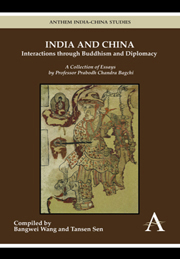 India and China: Interactions through Buddhism and Diplomacy
India and China: Interactions through Buddhism and Diplomacy Book contents
Prabodh Chandra Bagchi (1898–1956): A Model in the Beginnings of Indo-Sinic Buddhist Philology
from Appendix
Published online by Cambridge University Press: 05 March 2012
Summary
Prefatory Note
Early in 1997 I was invited to contribute a paper to a volume in celebration of an eminent Bengali-born savant Prabodh Chandra Bagchi (1898–19.IX.1956) on the occasion of the centenary year of his birth. To my regret, however, my extremely busy schedule at that time prevented me from writing anything. A year after that I was instead asked to send a few lines of appreciative word on his works. I hurriedly wrote a short tribute in praise of this grand savant. I always feel much indebted to such pioneers in the field of modern Indian and Buddhist studies.
In that short notice I placed special emphasis on the background discussing how Bagchi's work on Buddhist culture in India had developed even beyond the boundaries of his country, particularly to Central Asia and China. His wide range of interests lay in cultural aspects of Buddhism all over Asia. Without his teacher Sylvain Lévi, he might have not decided to pursue this line of research work. Bagchi was thus part of the lineage of French scholarship which began with Eugene Burnouf. After all, the goal is the study of humanities across the globe.
However, my paper may have gone astray. I have since heard no direct information from the organs in question as to whether or not it was published. No reply to my query in this connection has ever reached me from them, and to my knowledge this memorial volume never appeared.
- Type
- Chapter
- Information
- India and China: Interactions through Buddhism and DiplomacyA Collection of Essays by Professor Prabodh Chandra Bagchi, pp. 231 - 244Publisher: Anthem PressPrint publication year: 2011


